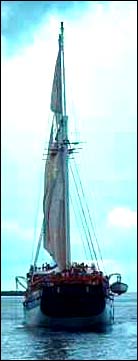
|
Podcast

|
Maturity
Encouragement
Good News
Church
Communion
Prayer
Christian Symbols
Scholarly Articles
Miscellany

|
Easter
Thanksgiving
Pentecost
Stations of the Cross

|
New Testament
Gospels
Acts
Paul's Letters
General Letters
Revelation
Topical Studies

|
Bible Studies
Articles
Books
Podcasts
Search
Menu
Donate
About Us
FAQ
Contact Us
Site Map
Pilgrim Daughter
by Dr. Ralph F. Wilson
 We searched for the ghost of fifteen-year-old Constance Hopkins
in the bowels of the reconstructed ship "Mayflower II,"
rolling gently aside a pier in Plymouth harbor. Where volunteers
dressed in period costume answered tourists' questions, Constance
had once huddled, miserably cold and damp, as fierce storms buffeted
the ship.
We searched for the ghost of fifteen-year-old Constance Hopkins
in the bowels of the reconstructed ship "Mayflower II,"
rolling gently aside a pier in Plymouth harbor. Where volunteers
dressed in period costume answered tourists' questions, Constance
had once huddled, miserably cold and damp, as fierce storms buffeted
the ship.
"According to the usuall manner," the old records relate, "many were afflicted with seasicknes." As the ship had only the crudest of conveniences and no sanitary facilities of any kind except the traditional bucket, the air in the narrow, crowded quarters below deck must have been nauseating at worst and at best simply staggering.
Constance and her younger brother were responsible to keep track of their three-year-old sister who was always scampering among the various families camped side by side in the hold's cargo compartments. It was all their mother could do, great with child, to brace herself as the "Mayflower" heaved in the heavy Atlantic storms. As Constance watched a tiny brother was born on the high seas, christened "Oceanus."
Since the "Mayflower" had left England nine weeks behind schedule, the New World's harsh weather threatened their very survival. The men went ashore in December to construct rude shelters; women and children spent the winter aboard ship anchored in the bay.
Winter took its toll. Journal entries feature the same melancholy theme week after week, for months on end:
"... Aboute noone, it began to raine ... at night, it did freeze & snow ... still the cold weather continued ... very wet and rainy, with the greatest gusts of wind ever we saw ... frost and foule weather hindered us much; this time of the yeare seldom could we worke half the week."
That winter more than half the heads of households perished. Aboard ship only five of eighteen wives lived through the ravages of scurvy, pneumonia, and tuberculosis. An entry for March 24th reads:
"Dies Elizabeth, the wife of Mr. Edward Winslow. N.B. This month thirteen of our number die. And in three months past dies halfe our company ... Of a hundred persons, scarce fifty remain, the living scarce able to bury the dead."
My daughter Annie, a descendent of Constance, tried to imagine the terrors of that winter for a young teenage girl. When not lying sick herself, she would doubtless be tending whimpering children, preparing food for their stricken mothers, and comforting the increasing number of orphans aboard the "Mayflower."
But spring finally came, and by the third week in March the weakened survivors rowed ashore in the longboat to take up residence in New Plimoth.
How could the Pilgrims talk about thanksgiving in the midst of life's most difficult trials? we wonder. Why not just curse God and die? They gave thanks for God's presence in their adversities because they knew that struggles did not have to make them bitter; struggles could make them better. These remaining Pilgrim daughters and sons, mothers and fathers, placed their trust in their God and laid the enduring foundations of a nation. Thanksgiving Day, 1621, did not just celebrate wild turkey and Indian corn; it celebrated the human spirit reaching out to God in gratitude for the blessings the Pilgrims still did possess.
"Yea, though they should lose their lives in this action," ancient documents say, "yet they might have comforte in the same ... All great & honourable actions are accompanied with great difficulties, and must be both enterprised and overcome with answerable courages."
No, the Pilgrims did not lack for courage.
Our family poked around in a windswept burying yard until we found the tombstone of Constance Hopkins Snow, age 72 years. And as my wife and daughter laid a bunch of hedge row wildflowers on her grave, we stood for a moment of silence, meditating on our brave and very personal link with that first Thanksgiving.
Copyright © 2026, Ralph F. Wilson. <pastor![]() joyfulheart.com> All rights reserved. A single copy of this article is free. Do not put this on a website. See legal, copyright, and reprint information.
joyfulheart.com> All rights reserved. A single copy of this article is free. Do not put this on a website. See legal, copyright, and reprint information.


 To be notified about future articles, stories, and Bible studies, why don't you subscribe to our free newsletter, The Joyful Heart, by placing your e-mail address in the box below. We respect your
To be notified about future articles, stories, and Bible studies, why don't you subscribe to our free newsletter, The Joyful Heart, by placing your e-mail address in the box below. We respect your